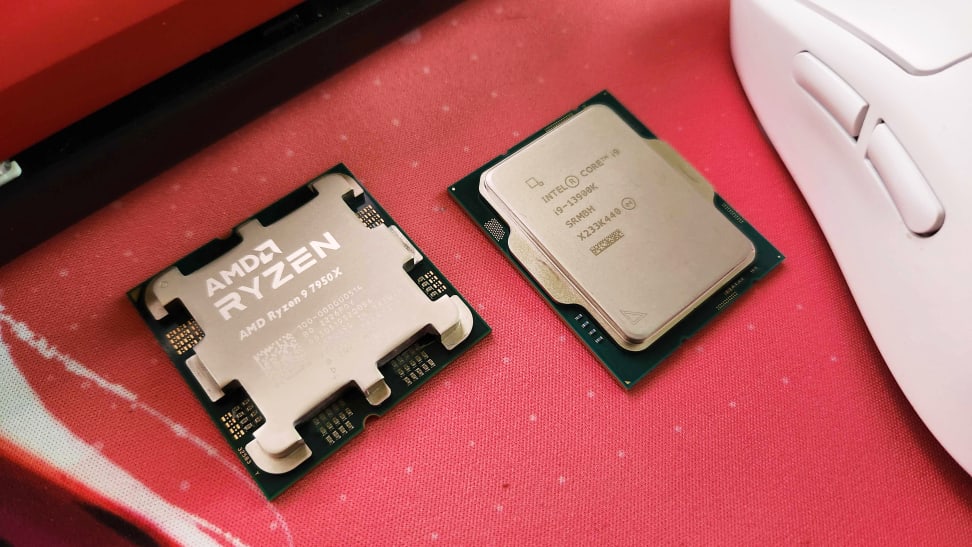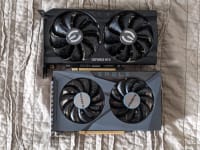 Credit:
Reviewed / Joanna Nelius
Credit:
Reviewed / Joanna Nelius
Products are chosen independently by our editors. Purchases made through our links may earn us a commission.
The Intel Core i9-13900K and the AMD Ryzen 9 7950X are the fastest of the high-end processors in 2023. Both CPUs are packed with more cores than you can shake a stick at and push clock speeds further than ever before. This is a godsend for both PC gamers and creative professionals, but there is a catch.
Both of these CPUs are extremely expensive, with the Core i9-13900K costing as much as $690 and the Ryzen 9 7950X as much as $700 when not on sale. Both processors are extremely powerful in their own right, but the right one for your needs is going to depend largely on how you regularly use your PC.
Price
Whether you go for the Intel Core i9-13900K or the AMD Ryzen 9 7950X, you’ll pay about $600 depending on where you buy either processor and if you can find them on sale.
The Intel Core i9-13900K launched for $609, but is available right now for around $579. Intel has released a special edition version of the processor, the Intel Core i9-13900KS, which is essentially an overclocked version with a 6.0GHz Max Turbo clock and specially selected silicon, but that’ll set you back even more at $729.
AMD’s flagship Ryzen 9 7950X is close to the same price as Intel’s KS variant. The processor launched at a much more expensive $698, but you can find it as low as $556 on Amazon.
Both the Intel Core i9-13900K and the AMD Ryzen 9 7950X are so close in price right now, but the Intel Core i9-13900K will likely be a better value for gamers who don’t need all 16 high-performance cores that the Ryzen 9 7950X brings to the table. However, that calculus changes if you need your CPU for heavy creative workloads.
Our pick: Intel Core i9-13900K
Performance
When you’re spending this much on a processor, it needs to be a performance powerhouse. Whether you go with Intel or AMD, you’re going to get incredible returns, but both processors shine in different workloads.
The Intel Core i9-13900K specifically shines in gaming. In games like Total War: Three Kingdoms, where CPU performance is paramount, the Intel Core i9-13900K manages 236 frames per second (fps) when paired with an Nvidia GeForce RTX 4090, compared to the 230 fps with the Ryzen 7950X. But in Cyberpunk 2077 it manages to match the AMD Ryzen 9 7950X. The performance winner largely depends on the game, but the Intel Core i9-13900K should have a slight lead over AMD in most games because it can achieve slighly higher single-core clock speeds.
However, that story changes when you start introducing creative workloads like video editing; the AMD Ryzen 9 7950X has a 10% lead on the Intel Core i9-13900K in Adobe Premiere, for instance. That might not sound like a lot, but when you are editing videos for a living, every second counts.
Heavily threaded applications are becoming more common every day, though, and while Intel might have the performance crown when it comes to gaming, the AMD Ryzen 9 7950X is a much more flexible part, which is important when you’re spending nearly $1,000 on a CPU.
Our pick: AMD Ryzen 9 7950X
Specs

AMD's Ryzen 7000 series processors have new architecture and a new look.
The performance of these two processors might be very similar, but the AMD Ryzen 9 7950X and the Intel Core i9-13900K use completely different CPU architectures to achieve their performance.
The AMD Ryzen 9 7950X uses a standard monolithic die. What this means is each processor is comprised of a number of identical CCXs or core complexes. That means this Ryzen chip has two groups of eight identical cores that all generally do the same thing, which results in an 8-core, 16-thread processor.
Intel has been using a hybrid chip architecture ever since it released its 12th-generation Alder Lake processors. This kind of architecture, known as big.LITTLE, was initially popularized by mobile devices like phones and tablets and has dedicated cores for performance-intensive tasks and dedicated cores for efficient tasks. Until Intel came along, hybrid x86 chips didn’t exist, only hybrid ARM chips like Apple’s M1 and M2.
The performance cores are similar to what you’ll find on the AMD Ryzen 9 7950X—strong CPU cores that can pump out performance. But Intel has paired these cores with smaller and less power-intensive efficient cores to take background tasks out of the way. This means you don’t have to worry about a desktop notification slowing down your Adobe Premiere render.
This is a forward-thinking approach that improves both system responsiveness and energy efficiency—and I think it’s about time AMD starts considering moving to this kind of chip architecture.
Our pick: Intel Core i9-13900K
Compatibility
For years, AMD stayed with the same socket, allowing users to upgrade their processors without having to completely rebuild their system. However, with the AMD Ryzen 9 7950X, you’re kind of stuck with an X670 or B650 motherboard.
It is likely that you’ll be able to upgrade to future AMD processors if you get one of these motherboards, but if you have an old X570 board and you want to upgrade, you’re out of luck.
The Intel Core i9-13900K is a little more flexible, but not by much. You can either use the new Z790 or you can use older 600-series motherboards, including Z690, B660, H670, and H610.
Generally speaking, however, AMD chipsets tend to have a longer lifespan than Intel’s. An Intel motherboard will typically be good for 1-2 generations of CPUs, while AMD boards typically last up to 3 or 4 generations. In this case, though, unless AMD finds a way to work a more modern hybrid chip architecture into a future processor on the same AM5 platform, you’re still likely better off grabbing an Intel chip anyways. Support for separate performance and efficient cores is only going to get better from here.
With either of these processors, you’re not going to want to go with a low-end board like an Intel B760 motherboard, because they’re both extremely power-hungry parts that have a tendency to hit extremely high temperatures by design.
Our pick: Intel Core i9-13900K
And the winner is...

Intel’s 13th-gen chips are also faster in gaming performance compared to AMD’s Ryzen 7000 chips.
A couple of years ago it seemed like Intel would never deliver another truly game-changing processor, but its 12th-gen chips with hybrid architecture it blew us all away. The Intel Core i9-13900K, like its predecessor, is an incredible desktop processor for gaming, even if it does get toasty when pushed to the limit.
If you’re going to be spending $600 or more on a single component, you want something that’s forward-looking enough to be at least a little future-proof. That’s what the Intel Core i9-13900K is. Intel has made the best processor on the market—as long as you have the cash to fork over.
The product experts at Reviewed have all your shopping needs covered. Follow Reviewed on Facebook, Twitter, Instagram, TikTok, or Flipboard for the latest deals, product reviews, and more.
Prices were accurate at the time this article was published but may change over time.


